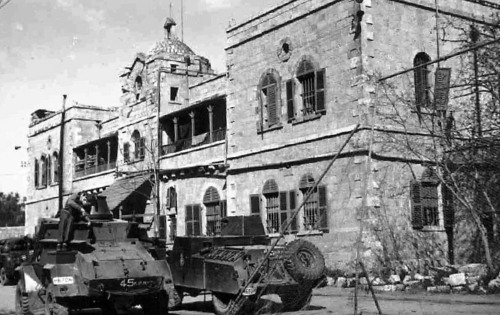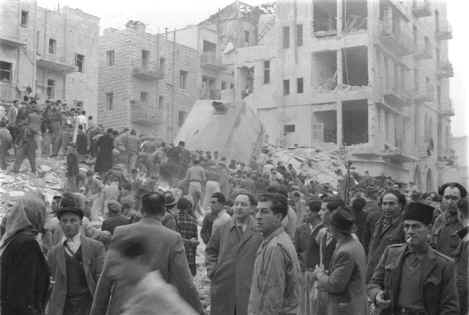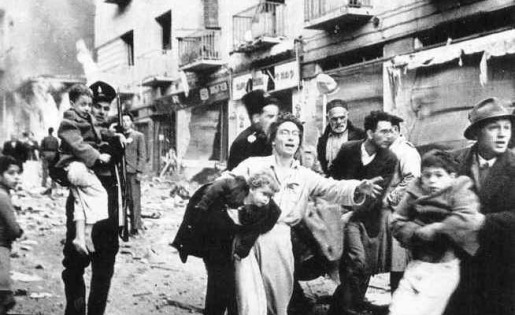Pages in Section 13

February 1948 Bombing at Ben Yehuda Street
ii. Massacres at refinery and Balad al Sheikh
iii. Battle for Jerusalem 1
iv. Ben Yehuda Street bombed
v. Jewish Agency bombed
vi. A traffic policeman reminisces
vii. Battle for the Roads 1 - Jerusalem
viii. Battle for the Roads 2 - Mishmar ha Emek
ix. Battle for the Roads 3- Deir Yassin
x. Haddassa Hospital Convoy
xi. Battle of the Roads 4- Gush Etzion
 Just after 6 a.m. on February 22nd, the crew of a police armoured car patrolling the Mustaphsha area of Jerusalem observed a convoy of four vehicles pass the Police billet travelling towards the centre of the town.
Just after 6 a.m. on February 22nd, the crew of a police armoured car patrolling the Mustaphsha area of Jerusalem observed a convoy of four vehicles pass the Police billet travelling towards the centre of the town.
The armoured car in the lead bore the number 597 and a man in a brown great-coat and navy blue police cap occupied the turret. The other vehicles were all standard military Dodge trucks with canvas covers, two 15 cwt and one a three tonner. Two persons, dressed as soldiers, occupied the cab of each truck.
As a police armoured vehicle had been stolen a few days previously the convoy aroused the suspicions of the crew of the patrolling car. The driver turned round and followed them towards Zion Square.
The soldiers guarding checkpoints had not been informed of the stolen car, however, so, owing to their seemingly British identity, the convoy passed through both British and Jewish checkpoints without difficulty.
While the genuine patrol car was waiting to show their identity cards the convoy drove to the corner of Ben Yehuda and Ben Hillel Streets, and parked outside the Atlantic Hotel, headquarters of the elite Palmach troops who guarded convoys, carrying food, and arms between Tel Aviv and Jerusalem.
The occupants of the trucks, dressed in British military uniform, jumped out. A vigilant hotel watchman challenged them so they killed him with a quick commando chop and threw him into a truck before clambering into the armoured car. The driver waited until the man dressed as a British policemen had lit fuses to the bombs hidden in the trucks and had joined them before racing off.
A few minutes later, the genuine police patrol car found the three trucks parked outside the Atlantic Hotel with their doors wide open, but there was no sign of armoured car 597. The driver of the genuine police armoured car slowed down beside the first truck, and saw smoke drifting from the rear. Fearing an explosion, he carried on towards King George Avenue but not fast enough. A heavy explosion threw the police vehicle forward, but the crew all lived to deliver their reports.
 This first explosion was followed by two more, equally powerful. The stone facade of the six-story Vilenchick Building bulged slowly outward, before tumbling into the street. The interior of Hotel Amdursky collapsed in a slow, dignified movement. Across the street, two apartment buildings crumbled to the ground as if clouted by a gigantic sledgehammer. All Jerusalem's ambulances and fire engines including those of the military rushed to render assistance.
This first explosion was followed by two more, equally powerful. The stone facade of the six-story Vilenchick Building bulged slowly outward, before tumbling into the street. The interior of Hotel Amdursky collapsed in a slow, dignified movement. Across the street, two apartment buildings crumbled to the ground as if clouted by a gigantic sledgehammer. All Jerusalem's ambulances and fire engines including those of the military rushed to render assistance.
 At first British Police were allowed to help with the rescue work. Gradually however, rumours spread round the crowd that this bombing was the work of the British police, a member of whom had already attacked the Jewish Press office in Ben Yehuda street and whose PMF squads in Jaffa had recently rampaged through Tel Aviv.
At first British Police were allowed to help with the rescue work. Gradually however, rumours spread round the crowd that this bombing was the work of the British police, a member of whom had already attacked the Jewish Press office in Ben Yehuda street and whose PMF squads in Jaffa had recently rampaged through Tel Aviv.
The British police were ordered off the scene. When British soldiers arrived to help dig victims from the rubble, the Jewish crowd stoned them. From then on Jews would only allow British police to patrol Zone 2 if accompanied by a Jewish police officer.
>That same evening Mustaphsha Police Station came under attack from a crowd of angry Jews.
Here is the report of the attack from Gordon Chillcott BP/C 488 kindly sent by his son Chris Barret, a BPPA member.:
My close friend, Ken Lister and I attended a meeting in the Old City and walked back in civvies late in the evening to be met with a strong challenge – the billet had been fired upon in the previous hour. Half an hour later we were again attacked and I found that if you fire a bren gun out of a window sitting on the edge of a bed you get a lap full of very hot cartridges! My most vivid memory of the night was of water dripping from cisterns onto the roofs of the flats from where the attack had come.
At least forty-six bodies were eventually dug out of the rubble in Ben Yehuda Street and 130 people were seriously injured.
Despite he leader of the Arab Holy Army claiming responsibility the bombing, the Jewish Agency conducted its own enquiry and drew the conclusion, which they presented to the police HQ, that the outrage was undoubtedly the work of the British Police. This conclusion was probably reached because most Jews were unable to distinguish between the PMF, now integrated into the main police force and the military police. Two deserters from the British military police, Sgt Eddie Brown and Cpl Peter Madison had indeed joined a Palestinian Arab, Azmi Djaomi, in leading this terrorist attack.
A British Palestine policeman who later had the task of escorting Brown and Madison to Britain after their court martial claimed neither showed the slightest signs of remorse, only gloating that a prison sentence was a worthwhile price for the reward they would receive from the Grand Mufti. However, it is rumoured that when they went to Egypt to claim their reward, they came away empty-handed.
One question remains, since Britain still had capital punishment in 1947 why weren't Brown and Madison executed instead of being imprisoned? By this time several members of Irgun had been executed for similar crimes.